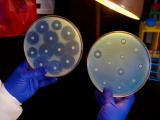Jun 16, 2010 (CIDRAP News) – Efforts to battle major diseases in the developing world are leading to increased drug resistance, creating a need for a coordinated global campaign to maintain the effectiveness of antimicrobial drugs, a US nonprofit policy research group said in a report released this week.
The Center for Global Development (CGD) in Washington, DC, said millions of children in the developing world die each year from resistant strains of common diseases such as malaria, pneumonia, other respiratory infections, and dysentery.
In the report, The Race Against Drug Resistance, the group urges the World Health Organization (WHO) to take the lead in reversing what it calls "a decade of neglect of drug resistance" and calls on drug companies, governments, philanthropies, and healthcare providers to get involved.
"Drug resistance is a natural occurrence, but careless practices in drug supply and use are hastening it unnecessarily," Rachel Nugent, chair of the CGD working group that prepared the report, said in a news release.
In recent years governments and private funders have succeeded in improving poor countries' access to drugs for malaria, HIV, tuberculosis, and other diseases, the CGD said. It praised these efforts, but said they are hindered by drug resistance that could be avoided, adding that "surprisingly little effort" has been made to prevent resistance.
The report says there is a strong association between the volume of drug use and emergence of resistance, especially where safeguards for appropriate use are weak. For example, in countries where antibiotic use is highest, 75% to 90% of Streptococcus pneumoniae strains are resistant.
The CGD said the report identifies the common drivers of resistance as "a mix of technology gaps, behavior that leads to inappropriate use of medicines, weak health systems, poor drug quality, and excessive use of antibiotics in agriculture."
Drug resistance is a problem in developed as well as developing countries, the report acknowledges. For example, it says that methicillin-resistant Staphylococcus aureus (MRSA) increased from about 2% to more than 50% of staph infections in many US hospitals between 1974 and 2004 and that MRSA kills more people in the United States than HIV/AIDS.
The CGD makes four broad recommendations for combating drug resistance.
The first is to improve monitoring of the problem. To this end, the CGD suggests that donor organizations and agencies such as the WHO work with developing countries to set up a network of surveillance laboratories to track the emergence and spread of resistant strains and quickly share the information. The group suggests that this network should produce a global drug resistance report every 2 years and establish a Web-based resource center to collect and share data.
The second recommendation is two-pronged. First, the pharmaceutical industry should "set voluntary standards to maintain the quality of its products from manufacturing through final delivery to the patient." Second, global and national partnerships of medicine providers should collect and promote best practices in drug prescribing and dispensing, share evaluations of what works, and adapt tested models to individual countries.
The third recommendation is for stronger regulation. Many national regulatory authorities lack the ability to enforce drug quality standards, which permits poor-quality and counterfeit drugs to reach patients. To address this, the CGD suggests that donor groups partner with regional economic commissions "to support new regional networks of national drug regulators and enhance existing ones to monitor drug quality and enforce laws."
Finally, the CGD calls for boosting research and innovation to speed the development of resistance-fighting technologies. One way to do this, it says, is to set up "a Web-based marketplace" to show off relevant research and innovation. "It would offer a brokerage facility to provide technical assistance, connect researchers with one another, and match good ideas with investors," the report states.
See also:
CGD report information, with access to full 90-page report
http://www.cgdev.org/section/initiatives/_active/drugresistanceglobalhealth
Jun 15 CGD press release
http://www.cgdev.org/userfiles/drug%20resistance/Drug%20Resistance%20Press%20Release%20Embargo%206.9.10.pdf























